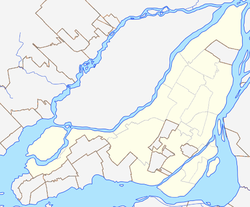Shaughnessy Village | |
|---|---|
 Apartment buildings in the Shaughnessy Village | |
Location of Shaughnessy Village in Montreal | |
| Coordinates: 45°29′34″N 73°34′49″W / 45.492814°N 73.58041°W | |
| Country | Canada |
| Province | Quebec |
| City | Montreal |
| Borough | Ville-Marie |
| Area | |
| • Total | 0.70 km2 (0.27 sq mi) |
| Population | |
| • Total | 15,677 |
| • Density | 22,396/km2 (58,063/sq mi) |
| Postal Code | |
| Area code(s) | 514, 438 |
Shaughnessy Village (sometimes referred to as the Concordia Ghetto) is a neighbourhood of Montreal, Quebec, Canada, located on the western side of the Ville-Marie borough. It is bounded by Guy Street to the east, Atwater Street to the west, Sherbrooke Street to the north, and René Lévesque Boulevard and the Ville-Marie Expressway to the south.
This neighbourhood is the most densely populated area of Quebec, due to the large number of high-rise apartment towers built in the 1960s and 1970s.[9] The area is characterized by high-density residential housing and small businesses, typically owned and operated by immigrants living in the neighbourhood, concentrated at its core, with stately Victorian grey-stone row houses and beaux-arts styled apartment blocks at the edges of the neighbourhood. It is a primarily institutional neighbourhood, with a university, junior college, seminary, hospital and architecture museum among many private schools, colleges and technical schools.
In 1981, local citizens named the neighbourhood after Shaughnessy House, built in 1874 for Thomas Shaughnessy, president of the Canadian Pacific Railway.[10] The house was declared a National Historic Site of Canada in 1974, and is now part of the Canadian Centre for Architecture.[11]
Other notable landmarks in the area include the Montreal Forum, the former site of the Montreal Children's Hospital on Atwater Avenue, and Le Faubourg Sainte-Catherine shopping mall and Cabot Square.
- ^ "Census Profile, 2016 Census". Statistics Canada. Statistics Canada. 8 February 2017. Retrieved 15 September 2017.
- ^ "Census Profile, 2016 Census". Statistics Canada. Statistics Canada. 8 February 2017. Retrieved 15 September 2017.
- ^ "Census Profile, 2016 Census". Statistics Canada. Statistics Canada. 8 February 2017. Retrieved 15 September 2017.
- ^ "Census Profile, 2016 Census". Statistics Canada. Statistics Canada. 8 February 2017. Retrieved 15 September 2017.
- ^ "Census Profile, 2016 Census". Statistics Canada. Statistics Canada. 8 February 2017. Retrieved 15 September 2017.
- ^ "Census Profile, 2016 Census". Statistics Canada. Statistics Canada. 8 February 2017. Retrieved 15 September 2017.
- ^ "Census Profile, 2016 Census". Statistics Canada. Statistics Canada. 8 February 2017. Retrieved 15 September 2017.
- ^ "Census Profile, 2016 Census". Statistics Canada. Statistics Canada. 8 February 2017. Retrieved 15 September 2017.
- ^ Montrealbits.com:Shaughnessy Village
- ^ Gyulai, Linda. "Of Blight and Renewal". PressReader. The Gazette (Postmedia). Retrieved 15 September 2017.
- ^ "L'Association du Village Shaughnessy Village Association". Retrieved 2008-03-30.
